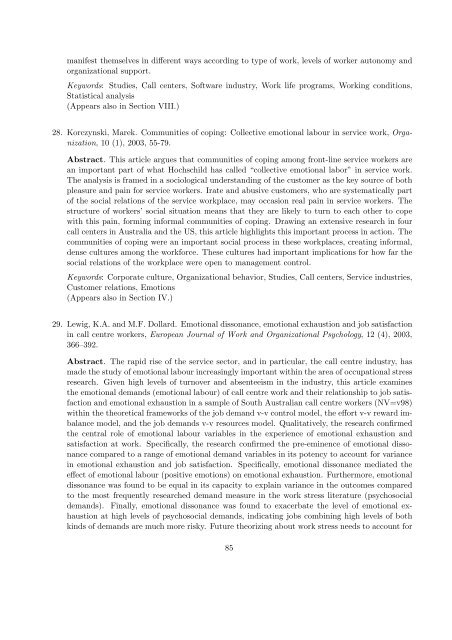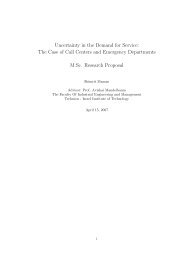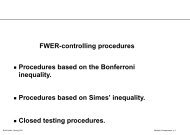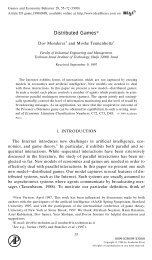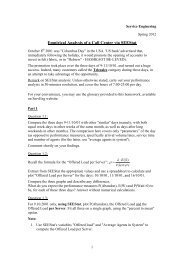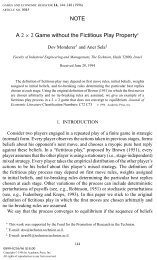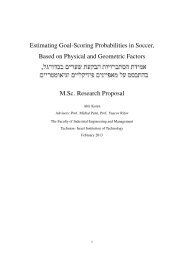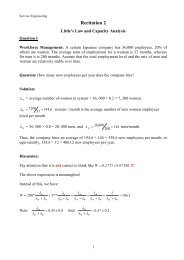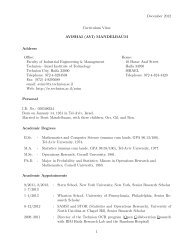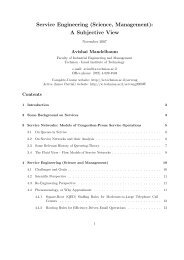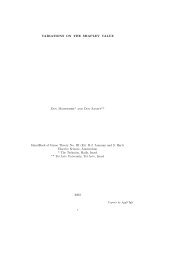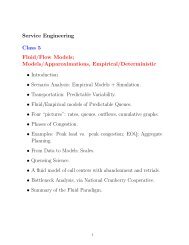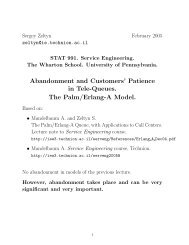CALL CENTERS (CENTRES) - Faculty of Industrial Engineering and ...
CALL CENTERS (CENTRES) - Faculty of Industrial Engineering and ...
CALL CENTERS (CENTRES) - Faculty of Industrial Engineering and ...
Create successful ePaper yourself
Turn your PDF publications into a flip-book with our unique Google optimized e-Paper software.
manifest themselves in different ways according to type <strong>of</strong> work, levels <strong>of</strong> worker autonomy <strong>and</strong><br />
organizational support.<br />
Keywords: Studies, Call centers, S<strong>of</strong>tware industry, Work life programs, Working conditions,<br />
Statistical analysis<br />
(Appears also in Section VIII.)<br />
28. Korczynski, Marek. Communities <strong>of</strong> coping: Collective emotional labour in service work, Organization,<br />
10 (1), 2003, 55-79.<br />
Abstract. This article argues that communities <strong>of</strong> coping among front-line service workers are<br />
an important part <strong>of</strong> what Hochschild has called “collective emotional labor” in service work.<br />
The analysis is framed in a sociological underst<strong>and</strong>ing <strong>of</strong> the customer as the key source <strong>of</strong> both<br />
pleasure <strong>and</strong> pain for service workers. Irate <strong>and</strong> abusive customers, who are systematically part<br />
<strong>of</strong> the social relations <strong>of</strong> the service workplace, may occasion real pain in service workers. The<br />
structure <strong>of</strong> workers’ social situation means that they are likely to turn to each other to cope<br />
with this pain, forming informal communities <strong>of</strong> coping. Drawing an extensive research in four<br />
call centers in Australia <strong>and</strong> the US, this article highlights this important process in action. The<br />
communities <strong>of</strong> coping were an important social process in these workplaces, creating informal,<br />
dense cultures among the workforce. These cultures had important implications for how far the<br />
social relations <strong>of</strong> the workplace were open to management control.<br />
Keywords: Corporate culture, Organizational behavior, Studies, Call centers, Service industries,<br />
Customer relations, Emotions<br />
(Appears also in Section IV.)<br />
29. Lewig, K.A. <strong>and</strong> M.F. Dollard. Emotional dissonance, emotional exhaustion <strong>and</strong> job satisfaction<br />
in call centre workers, European Journal <strong>of</strong> Work <strong>and</strong> Organizational Psychology, 12 (4), 2003,<br />
366–392.<br />
Abstract. The rapid rise <strong>of</strong> the service sector, <strong>and</strong> in particular, the call centre industry, has<br />
made the study <strong>of</strong> emotional labour increasingly important within the area <strong>of</strong> occupational stress<br />
research. Given high levels <strong>of</strong> turnover <strong>and</strong> absenteeism in the industry, this article examines<br />
the emotional dem<strong>and</strong>s (emotional labour) <strong>of</strong> call centre work <strong>and</strong> their relationship to job satisfaction<br />
<strong>and</strong> emotional exhaustion in a sample <strong>of</strong> South Australian call centre workers (NV=v98)<br />
within the theoretical frameworks <strong>of</strong> the job dem<strong>and</strong> v-v control model, the effort v-v reward imbalance<br />
model, <strong>and</strong> the job dem<strong>and</strong>s v-v resources model. Qualitatively, the research confirmed<br />
the central role <strong>of</strong> emotional labour variables in the experience <strong>of</strong> emotional exhaustion <strong>and</strong><br />
satisfaction at work. Specifically, the research confirmed the pre-eminence <strong>of</strong> emotional dissonance<br />
compared to a range <strong>of</strong> emotional dem<strong>and</strong> variables in its potency to account for variance<br />
in emotional exhaustion <strong>and</strong> job satisfaction. Specifically, emotional dissonance mediated the<br />
effect <strong>of</strong> emotional labour (positive emotions) on emotional exhaustion. Furthermore, emotional<br />
dissonance was found to be equal in its capacity to explain variance in the outcomes compared<br />
to the most frequently researched dem<strong>and</strong> measure in the work stress literature (psychosocial<br />
dem<strong>and</strong>s). Finally, emotional dissonance was found to exacerbate the level <strong>of</strong> emotional exhaustion<br />
at high levels <strong>of</strong> psychosocial dem<strong>and</strong>s, indicating jobs combining high levels <strong>of</strong> both<br />
kinds <strong>of</strong> dem<strong>and</strong>s are much more risky. Future theorizing about work stress needs to account for<br />
85


